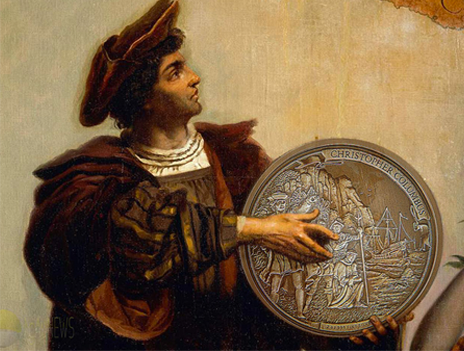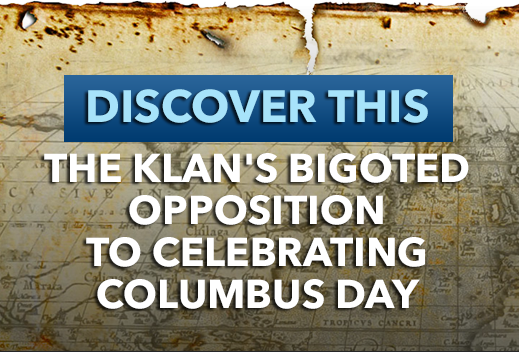
Learn the facts versus the myths surrounding Christopher Columbus, the Italian explorer whose voyage of discovery to the New World in 1492 linked Europe and the Americas and began a new age of exploration.
Myth: Columbus did not actually discover anything.
FACT: Columbus discovered America. When he set sail in 1492, no one on either side of the Atlantic knew the other was there. His voyage initiated the first continuous engagement between the peoples of the European and American continents. He brought together diverse cultures previously unknown to each other and sparked a mutually beneficial exchange of goods and ideas. Viewed from either side, his was most certainly a voyage of discovery.
Myth: Columbus committed genocide.
FACT: Columbus did not commit genocide. He sought to form good relationships with the native peoples of the New World and had no intention of doing them any harm. He had intended to sail to Asia, a land both populous and technologically advanced. His intent was trade and evangelization, not conquest. In exploring and settling the New World, Columbus frequently ordered his men to treat the natives well and not commit injustices or atrocities against them. Columbus punished and even executed some of the settlers who went against his orders and abused the natives. Scholars like Stanford professor emeritus Carol Delaney describe his interactions with the native peoples as generally benign and his motivations as religious; he was not violent, hostile, or cruel to those he encountered. Furthermore, the vast majority of the natives who died in the years after Columbus’ arrival succumbed to communicable diseases inadvertently transmitted by the Europeans rather than from any intentional act on the part of Columbus, his men or the settlers.
Myth: Columbus is to be blamed for bringing diseases to the New World that killed many natives.
FACT: Inadvertently, Europeans did bring communicable diseases to the New World for which the native peoples had little or no immunity, and great numbers died as a result. Some diseases may also have been spread to the Europeans by the natives. The vast majority of indigenous peoples who died in the years following the European settlement of the New World perished from disease rather than from conflict or abuse at the hands of European settlers. This is a tragic, unintended consequence of the encounter between two cultures, but certainly not something for which Columbus — or anyone else — can be held responsible or culpable.
Myth: Columbus introduced slavery to the New World.
FACT: “Slavery was common, even among [native] people in the Caribbean,” according to former Stanford anthropologist Carol Delaney. However, slavery was not Columbus’ goal; friendship with the native peoples was. Even today, enemy combatants are often captured and imprisoned, and criminals are often assigned to do manual labor.
Myth: Columbus sought to force the natives to work.
FACT: Columbus resisted efforts to force the natives to work. He expected his own men to build the settlements, search for natural resources, and perform their own labor. When he consented to using native laborers, he sought to compensate them properly as vassals of the Spanish crown. However, Columbus’ men violated these standards. Facing rebellion and under duress, Columbus allowed a system of labor already instituted by the rebels. Columbus himself is well-documented to have advocated for just treatment of the natives.
Myth: Columbus was a brutal man.
FACT: Columbus often sought to restrain his men from mistreating the native peoples. In a time when some would question whether the native peoples of America were truly human, Columbus immediately acknowledged their humanity and innate dignity. He recognized them as humans with immortal souls and was concerned for their salvation and their right to choose freely to embrace the Christian faith. He even adopted the son of a native chief as his own son.
Myth: Columbus forced his religion on the natives.
FACT: Columbus was a devout Christian who desired to introduce the native peoples to Christianity, but he did not force any to convert. He specifically saw the Indians as “a people who would be better freed [from error] and converted to our Holy Faith by love than by force,” as he wrote in his diary. He asked the monarchs and the Pope to send priests who would learn the native language and instruct the people in the Christian faith prior to baptism.
Myth: Columbus was arrested and returned to Spain in chains for his cruelty against the natives.
FACT: After his third voyage, while he was governor of Hispaniola, Columbus was indeed arrested and taken back to Spain in chains, but it was for actions taken against rebellious European settlers. He had punished and even executed some of the Europeans for abusing the natives. Bartolomé de las Casas, although sometimes critical of aspects of Columbus’ administration, wrote of the “sweetness and benignity” of the explorer and added: “Truly, I would not dare blame the admiral’s intentions, for I know him well and I know his intentions were good.”
Myth: Columbus was only after gold, glory and his own self-interest.
FACT: Columbus surely desired to be rewarded and recognized for his efforts, but these were not his primary driving motives for his voyages to the New World. His motivations, for the most part, were religious, including the desire to bring Christianity to foreign lands.
Myth: Columbus was a poor navigator.
FACT: Columbus was a skilled navigator who made an unprecedented voyage across the Atlantic and found the New World. Although Columbus did not reach Asia as he had hoped, his voyages revealed an entire continent previously unknown to the people of Europe. Because he kept journals of his voyages, he blazed a path for other explorers to follow. In addition, Columbus did something none of his contemporaries had done before him: He sailed west into the unknown, found land and returned safely.
Myth: Columbus is a symbol of white supremacy.
FACT: In fact, the Ku Klux Klan in particular has demonstrated enormous hostility to Columbus because he was Italian and Catholic, rather than Anglo-Saxon and Protestant, which aroused their anti-immigrant and anti-Catholic bigotry. Historically, the KKK actively protested Columbus celebrations and monuments to the explorer.
© 2017 National Christopher Columbus Association. All Rights Reserved.

